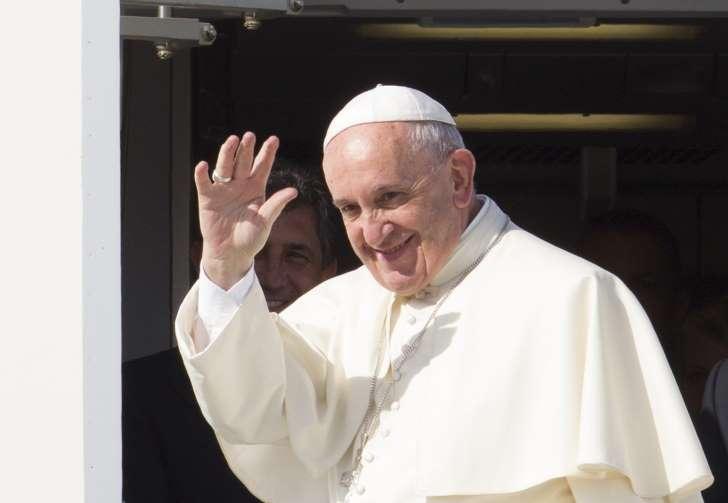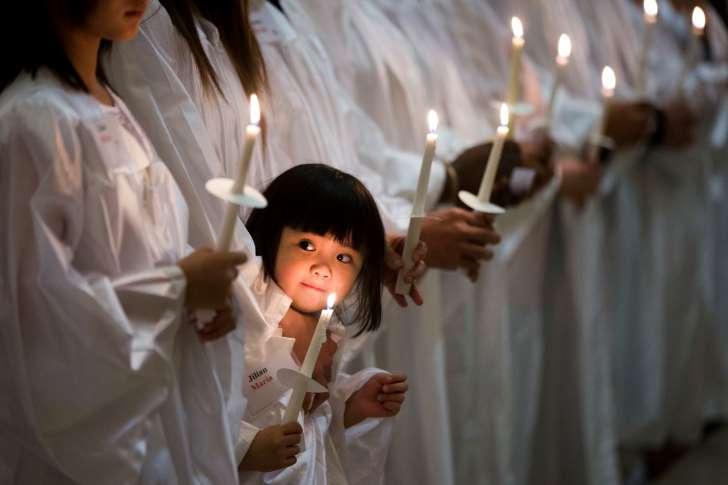|
Pope faces changing Catholic identity in U.S.
By Cathy Lynn Grossman
[with video] A photographer shooting the landscape of American Catholicism today needs a wide-angle lens. The image would have to stretch to include a Hispanic family at a booming Phoenix church, a disaffected millennial in Seattle who just barely calls herself Catholic, a Mass-every-Sunday senior in Boston and a convert, such as Republican presidential candidate Jeb Bush. Of course, Pope Francis can’t see this entire panorama on a six-day visit, but they can see him. And maybe there will be a “Francis effect” that prompts new levels of pride and engagement in the church. Studies show that attendance at Mass has been flat for decades. Catholic identity continues to decline among non-Hispanic whites. Meanwhile, immigrant families — Hispanic, Asian and African — keep the overall Roman Catholic population high. How high, though, depends on how you count. The Official Catholic Directory counts 68.1 million U.S. Roman Catholics, based on parish reports drawn from the nation’s 195 dioceses. Those reports add up attendance at Mass and participation in the sacraments. But public surveys that ask adults to name their religious identity find millions more Catholics — including those who have no parish connections. When the Center for Applied Research in the Apostolate (CARA), a Catholic research agency, aggregated surveys from several major research bodies, it came up with 81.6 million Catholics. Whom those numbers represent changes every day. The entire U.S. religious marketplace is in constant churn, with people leaving their childhood faith for other religions or none at all. Nearly 1 in 4 adults are now “nones” — people who claim no denominational identity. A new Pew Research survey of U.S. Catholics, released Sept. 2, found that 20% of Americans call themselves Catholic by religion today. That’s a statistically significant drop from nearly one in four (23.9%) in Pew’s original 2007 Religious Landscape Survey. The Pew Research survey also found that 13% of all Americans call themselves former Catholics — people reared in the church who no longer claim the label. Although the Catholic Church outperforms every major U.S. Protestant denomination in keeping believers within the fold, Pew still calculates that six Catholics leave the church for every one person who chooses to join. Sociologist Mary Gautier, a senior researcher for CARA, says she doesn’t like the terms “former Catholic” and “ex-Catholic.” Gautier prefers to call them “lapsed” Catholics because, she says, they may reclaim their Catholic identity at any time. “The core things about what it means to be Catholic haven’t changed for generations: concern for the poor, love for Jesus and Mary, prayer,” Gautier says. Even if such people reclaim a Catholic identity, they still might not return to Mass or resume receiving the sacraments. Most Catholics don’t attend or partake, either, according to “Sacraments Today,” CARA’s 2008 study of beliefs and practices, Only about 1 in 3 adult Catholics (31.4%), chiefly older women, attend Mass in any given week, according to that survey of 1,007 self-identified Catholics. While that percentage has been stable for years, participation in sacraments such as baptism, Communion and confirmation has slid with each succeeding generation. Take confirmation: 95% of Catholics before the 1960s were confirmed, but only 69% of Catholic millennials are. A 2015 study of Catholic family life found that 68% of Catholics with children under age 18 have not given their children any form of religious education. Holy Cross Family Ministries, the organization behind the famous slogan “The family that prays together stays together,” commissioned this research in advance of the pope’s U.S. trip. The study found that 1 in 3 parents did not find it very important that their children celebrate their first Communion, and 1 in 4 didn’t consider it very important that their children be confirmed. “If you don’t have first Communion and you’re not confirmed, you are more likely to leave the faith as an adult,” says Mark Gray, a senior researcher with CARA and co-author of the report. “You can’t take Communion or really practice your faith.” And practicing the faith can be a challenge at a time when the number of priests is dwindling. In 1965, there were 58,632 priests serving 46.3 million Catholics in 17,637 parishes, or roughly one priest per 800 Catholics. By 2015, there were 37,578 priests scattered across 17,337 parishes serving 68.1 million U.S. Catholics. That’s about one priest for every 1,812 Catholics. Parishes and Catholic schools are consolidating or closing in Northeast and Midwest cities as aging Catholics die and young families move south and west. There are 5,302 Catholic elementary schools today, about half as many as there were in 1965. Many of the closed churches and schools were in ethnic parishes founded decades ago by European immigrants in tightly knit Irish, Italian, Polish or German enclaves. Now, the parishes of the South and West are exploding with young families but short on the infrastructure to serve them. According to Archbishop of Los Angeles Jose Gomez, “70,000 babies were baptized last year in Los Angeles, more than the combined total of all the infants baptized that year in New York, Chicago, Philadelphia and Washington D.C.” Most of those babies are Hispanic and the children of immigrants, he says. Hispanics make up more than 70% of Catholics in Texas, California and New Mexico and nearly 60% of Catholics in Arizona and Nevada, according to the Public Religion Research Institute. Overall, Pew Research finds that 34% of Catholics today are Hispanic, up from 29% in the original 2007 Pew Landscape survey. They’re significantly younger than the non-Hispanic population – 42 is the median age for Hispanic Catholics, compared with 53 for non-Hispanic whites. CARA’s family study of Catholic parents age 25 to 45 found 54% identify as Hispanic. The church’s celebration of families is the culmination of Pope Francis’ U.S. tour: Philadelphia is hosting the church’s World Meeting of Families. It celebrates the Catholic ideal of heterosexual marriage with children. That, however, isn’t exactly what the U.S. flock looks like now. The Pew survey released Sept. 2 took a fresh look at U.S. Catholic family life and Catholics’ views on Pope Francis’ agenda. Some of the key findings show U.S. Catholics’ experiences and views are at odds with the church’s ideal of a man and woman wed for life and rearing children together.
Without an annulment through the church, those remarried Catholics are disqualified from receiving Communion. The status of divorced and remarried Catholics will be a major topic for the church’s hierarchy at the Synod of Bishops in Rome in October.
Many want to see changes in their church to:
On other important issues, the new survey found that most align the church teachings they consider “essential” to what it means to be Catholic. Leading the list:
Pew’s survey, conducted from May 5 to June 7 included 1,016 self-identified Catholics, has a margin of error of +/–3.5 percentage points for Catholics. The three pillars of the pope’s agenda — social and economic justice, environmental stewardship and the value of the traditional family — resonate with many U.S. Catholics, but not all. The new Pew study also finds only a minority see addressing climate change (29%) or opposing abortion (33%) as “essential” to their Catholic identity. Catholics are evenly divided over whether it is sinful to spend money on luxuries without also giving to the poor. Neither do most see it as a sin to use energy without concern for the impact on the environment. However, one Pew survey number should give him hope: 7 in 10 U.S. Catholics say they cannot ever imagine leaving the Catholic Church, no matter what.
|
.
Any original material on these pages is copyright © BishopAccountability.org 2004. Reproduce freely with attribution.

